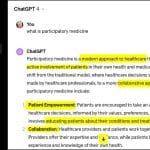The Pew Internet Project released the latest estimate for the e-patient population: 75% of internet users. Details on this and an upcoming survey follow…
My colleagues recently updated our top three trend charts: Who’s Online, Internet Activities, and Daily Internet Activities.
Two of the new data points relate to health and health care. The October-December 2007 national phone survey shows that 75% of internet users answered yes to the single-line question, “Do you ever use the internet to look for health or medical information?” 10% of internet users say they searched for health information “yesterday,” which in a tracking survey like this one yields a picture of the “typical day” online. Health has moved up in the “typical day” list (from 7% in 2006 to the current 10% of internet users), but for most people the average day includes lots of emails (60% of internet users), general searches (49%), and news reading (39%) if they are online at all (30% of internet users are offline on a typical day).
The usual patterns among the basic demographic groups hold true:
68% of online men look online for health info
81% of online women
76% of white internet users
65% of African American internet users
71% of English-speaking Hispanic internet users (new health data on the whole Latino population is coming out August 13 from the Pew Hispanic Center)
68% of 18-29 year-old internet users
78% of 30-49s
76% of 50-64s
71% of internet users age 65+ (but remember, only one-third of seniors go online at all)
The Oct-Dec 2007 survey is also distinguished by the fact that we included a group of cell phone users in our sample. We believe this is an important part of capturing an accurate picture of the U.S. population since 14.5% of all American adults live in households with only wireless phones (see “Polling in the age of cell phones“).
What do these numbers have to do with participatory medicine? I have seen our data used over and over to convince policy makers, medical professionals, investors, and even patients themselves that the internet is an important source of health information and a force for change in health care (whether for good or for ill). I’m like an ammunition dealer in the internet wars — all sides use our data since the Pew Internet Project does not endorse technologies, industry sectors, or outcomes.
In the end, what I said in March still holds true whether the estimate is 75% or 80% of internet users seeking health information online: When this many internet users are doing something, the horse is out of the barn.
The Pew Internet Project will update our 17 health topic trend data in a survey to be fielded this fall but we are collecting ideas about what else we should ask e-patients. I would love to hear new ideas either here in the comments or via email: What are your observations? Which health social media applications are gaining traction? What are you worried about? What are you excited about? What’s next?






Susannah,
The numbers continue to grow, and your point about the horse being out of the barn is spot on. But, I wonder if there is data on how much trust there is in that information. I read an article recently about a survey that suggests e-Patients don’t trust “patient generated” information (wonder how that was defined. As John Lester has said, much of the value is in the conversation itself, not just the information exchange). The news article also implies that patients trust information on line from providers, especially their own providers, much more. This supports some of the focus group work we did with our patients in the late 90’s. They really wanted to hear that the content they found on line was “approved” or written by their providers
Thanks, Dan! Here’s a link to the study on Envision Solution’s site. To confess, I have not had a chance to read the study, but I will and promise to comment soon.
For those not aware of John Lester‘s work — he and Dan Hoch founded the BrainTalk Communities. Here is a PLoS Medicine article with a bit of their story.
Dan:
My group Envision Solutions developed the study you referenced. With regard to trust, we asked Americans which sources they would trust the most if they had a mild or serious condition. We also asked which sources they would go to first if they thought they had a medical problem. We asked a single answer question in order to determine Americans’ “gut” most-trusted sources. We found that content developed by patients scored low on this measure of trust in every question. However, younger Americans are much more trusting of user-generated (i.e., patient, provider) content in general.
However, it should be noted that online health content is having an impact — again, especially among the young. 38% of adult Americans and 43% of people age 18-34 said they have doubted a medical provider’s advice because it conflicted with something they read online.
Your final point about people being more confident about information that is “approved” or vetted by experts was confirmed in our study. You can download the full study results here.
Fard’s comment is very interesting. So the Envision study is based on healthy Americans view of what they think will happen if they need to find information about a medical condition.
I think the same question should be asked to a population of people already suffering from a serious condition. As we have experienced for 15 years people have no clue about the power of online patient groups until they join one and experience first-hand their multiple benefits.
The more equipped and informed the e-patients become the more they learn to take information from “vetted” sites with a larger and larger grain of salt. Barely a week goes on now without news of the latest scandal about tainted results, tainted methodologies or scientists forgetting to mention conflicts of interest. For many informed patients, the data vetted by their online social network is what they view as the gold standard.
Sussanah,
Trust in the medical information obtained on the internet is all about reliable and authoritative resources. Like all research, one must be very critical of the source of the information and the credentials of the author(S), who are presenting the data. Remember, all information is open for discussion with a review of the risks/benefits of the recommendations that are presented. This discussion must take place with you the patient and your health care professionals. Hopefully, you will then be able to make the appropriate choice for your medical decision making.
I hope that my book — Dr. Weinberg’s Guide to the Best Health Care Resources on the Web, will help with you medical health resources.
http://WWW.DRWEINBERGSGUIDE.COM
Thanks as always.
Harlan R. Weinberg, MD, FCCP
I got a few inquiries about publishing a more official “report” on our latest estimate of the e-patient population. That column is now up on the Pew Internet Project site (originally published on iHealthBeat).
What is the population amount in the Year 2008 for women and men?
Hi Roselin,
Are you looking for the U.S. population numbers for men and women? Or the e-patient estimate in millions? The Census can provide the first one better than I can and unfortunately, the Pew Research Center no longer provides our data in “real numbers” — just percentages of the population.
Susannah